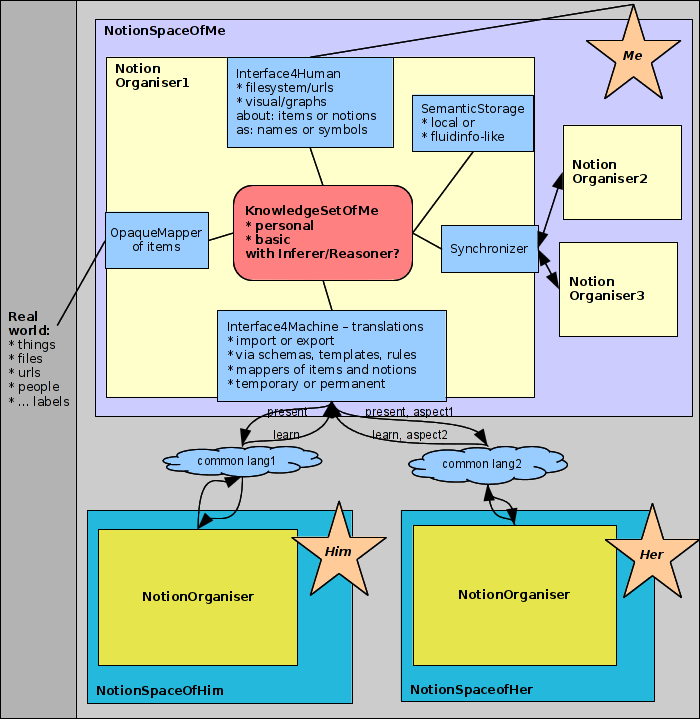Notion organiser in brief
Notionery: system that helps you do "routine" things like remembering, learning and expressing yourself, about your known things
(subjects, themes, domains, people, whatever you have idea/notion of).
other names:
- Garden of personal notions
- Notion organizer
- Notioner
- software "Me"
see the brisk description over at my site
what is it - core goals/concepts:
- keeps your knowledge expressed in your own notions/values/terms/names, not in anyone else's (files/ URLs/ approved-schema/ global-ontology/..)
- make your knowledge explicit and allow translations BOTH ways in / out. The way of translations is also knowledge, meta, even longer lasting
- the user is you. and just then everybody else
- family / organizations / groups are another (virtual) users. different target audiencies are also diff.meta-users
- communication is translation, not synchronizing
- sync only works within one common notionspace - yours
- X translates/presents (part of) hir knowledge for Y. Y takes that and translates it into his own (picking or merging or rejecting parts). The more X and Y know about each other, the easier/thinner the translation on each side. This applied over diff. domains / patterns
- everyone may talk to everyone - no central control
- metadata FROM masses - in user's OWN way/notions, the way user decides to present it (translate/filter)
- metadata TO masses - in whoever external meaning (specific person or group or aggregated), the way user decides to receive it (translate/filter)
- devices and applications are in/outlets, not target - just a way of interaction - different usages allow/need different interactivity (colder or hotter) hence different devices/applications
- not a framework or platform in pure software meaning... more of a philosophy.
knowledge flow (with some mutual overlap):
- produce - compose/decompose/ structure/ order, classify, aggregate / generalize
- consume - browse, search, filter
- exchange - translate:
- out-to-in : + pay attention = learn
- in-to-out : + select = express
- in-to-in : remember = re-evaluate past
- manage - store, sync=copy, history
the people are in the equation
Seems the hardest thing to do within the knowledge domain, is to get the stuff out of the people. Anything knowledge-related hits this wall.
And (see Nonaka1994),
expressing is the most unclear/unstudied mode of knowledge-making. Technical stuff - like translation, storage, inference, communication, interfaces..., is probably doable.
or well, viable. But how to get explicit the stuff from the head...
It's same as in software-making - it's the people that are the trouble (and the fun).
Hypothese1. The effort required for capturing notions with the aim to store, translate and (re)use them, is too much work, too cumbersome and without sufficient sizeable and/or sufficiently clear benefits.
(thanks, Maarten)
well, that is a Fact. Lets live with it.
here some thoughts from some months ago, while working on this and related stuff (e.g. re-wiring my site):
-
... i've tried to summarize my digging around personalization, semantic "web" 3.0, linked data, faceted search and what not.
it's all theoreticaly sound, except that noone bothers to put people in the equation. the problem with all of it is very earthy: all things match some language (classification is a primitive language), and language is, what? fictional thing. All the approaches are still
simply statistical thus mathematical thus virtual - anything can be 5 and 5 can be anything. Sooner ot later it becomes Calling names, of sorts, esp. with simplistic languages.
The context is the person (and hir state of mind + time-relation, now- then- future), and that context is lost after first typed word, and isn't gained back on 10th, and probably even on 100th or 1000th.
That's why suddenly everyone are interested in all sort of "unconscious" automatic gatherable contexts, like geography, backlinks, open applications, tweets etc. Which doesnt really solve the problem, only narrows and moves it elsewhere.
hence, the easily found solution is go other way around - can't understand what people want (?#@), so let them have what is understood ($$$). After all it's yet another kind of virtual "crowd brain", so who cares - if one doesnot think, s/he would be much better this way,
living the safe life of something else (e.g. idol). Those who think, would still have to dig for their own life - but it never has been any different.
-
... i keep adding stuff to the page... and in a way a feel more and more into.. deep hole?. somewhat hopeless. esp. the more i see people involvement as huge factor, and i start seeing why everyone so far is staying away from all this. it's much easier to analyze million words that are there and "correlate" and call that mess "THE crowd wisdom" than to make someone write 10 coherrent words of HIS own, and worse, put HIS system behind it. machines do what u tell them, people dont.
Fighting dogmas
the several times i presented+explained the idea, i felt the sheer resistance of the common-rails thinking, at different stage/level for different people, but always some.
There's sooo much of the "culture" that has trained us to take for granted and not to think about things (=beliefs) that others have come to believe (without thinking for themselves).
have you noticed that most things around are biased or based on "There must be only one" Single Order of Everything... so i got questions like "all science (IT) so far is trying to unify the world, and you're trying to break it apart?"
Just see for yourself. These characteristics revert certain dogmas (turn one, rest follow like dominoe):
- decentralization = no cathedrals: "there must be only one language/server/comm-channel/.../ knowledge-monopoly" - no, everyone IS knowledge-server ;
everyone is like a house - some a shack, some a skyscraper - but still a house
- activation: "let people write whatever, then we will collect/analyze/index/rate/.." (passive) - No, people do analysis themselves
- humanisation: "www is made of servers" - no, www is made of people and their opinions (and then devices)
- utilisation: "devices are end-means" - no, devices/apps are just way of interaction
- real personalisation: "profiling is about what others see of you" (in their terms) - no, This is what _you think of it, your terms
- real communication: communication is translation, not "just synchronising"
- and all this probably means different money flowand direction
- the coordinates of the "space" of notioners are only who-when (brain/time) - all else is a perception (items).
And, internaly, time is not the external common mathematical time, but the personal one. Although in order to be able to communicate, it is converted/translated to and from common one. e.g. "when i got married" depending on aspect may translate to a date, year, or season, or age..
btw, this lines up with Hofstede's cultural dimensions and my idea of person-geografical "years" - someone being born out of time and out of space..
communication+entities diagram
 Eventual architecture:
Eventual architecture:
- one instance matches one semantical NotionSpace, say, of Me
- central is KnowledgeSetOfMe. all else is around, star-like
- contains personal semantics (as well the base axioms/rules)
- not a piece of active software as such (in common understanding), but like set of rules/facts/names
- stored in SemanticStorage (local or fluidinfo-like. external storage may need opaquing of all data)
- probably has InfererReasoner (or each thing around has one?) - like an ExpertSystem
- connects via Synchronizer to other KnowledgeSetOfMe (replication of same NotionSpace)
- interfaces real world via OpaqueMapperOfItems
- interfaces human me-user via HumanInterface - filesystem/urls, visual-graphs - names, symbols, gestures, etc
- interfaces other people's NotionOrganisers(machines) via Translators:
- ImportTranslators and ExportTranslators
- have mappers of items/tags
- maps relations via schemas/templates/transformers
- permanent (stored translators) or temporary (for browsing/peeking)
- each part above is just an interface, with many variants, made by different parties now or then, and biased towards different interaction, completeness, complexity, device, etc
Software that may be related or usable
note, most things below are biased or based on "There must be only one" Single Order of Everything
- peer-to-peer semantic wiki is a closest concept to Notioner. one NotionSpace matches one wiki; translations are needed between separate spaces/wikis (see object consolidation below)
- DBIN.org - Semantic Web Communities2006 - seems a newsgroup-like p2p exchange of semantical annotations, demo, java, rough.
- Diaspora - distributed social network
- Gellish language 2005+ - semi-natural formal (meta) language representing a complete ontology and dictionary to describe concepts and relations in an uniform way, i.e. meta-software - with the methodology of how to define new concept , modelling, etc
- SWAP CWM pychinko reasoner - ~2002, semantic inference engines, n3 language, parser/compilers, and all that jazz - abandoned??
- deri pipes pipe example - (possibly distributed) pipe-line to produce result from sources via operators, i.e. query from somewhere, replacing X with Y, and merge with data from elsewhere on some criteria, and all this wrapped as another source (url)
- sync-hronization ( Note "graph" is usualy misused for graphics)
- semantic filesystems (i.e. a storage+some reasoning/querying) - wikipedia
- semantic storage:
- CLiPS pattern - NLP, graphs, web / python

 Eventual architecture:
Eventual architecture:
